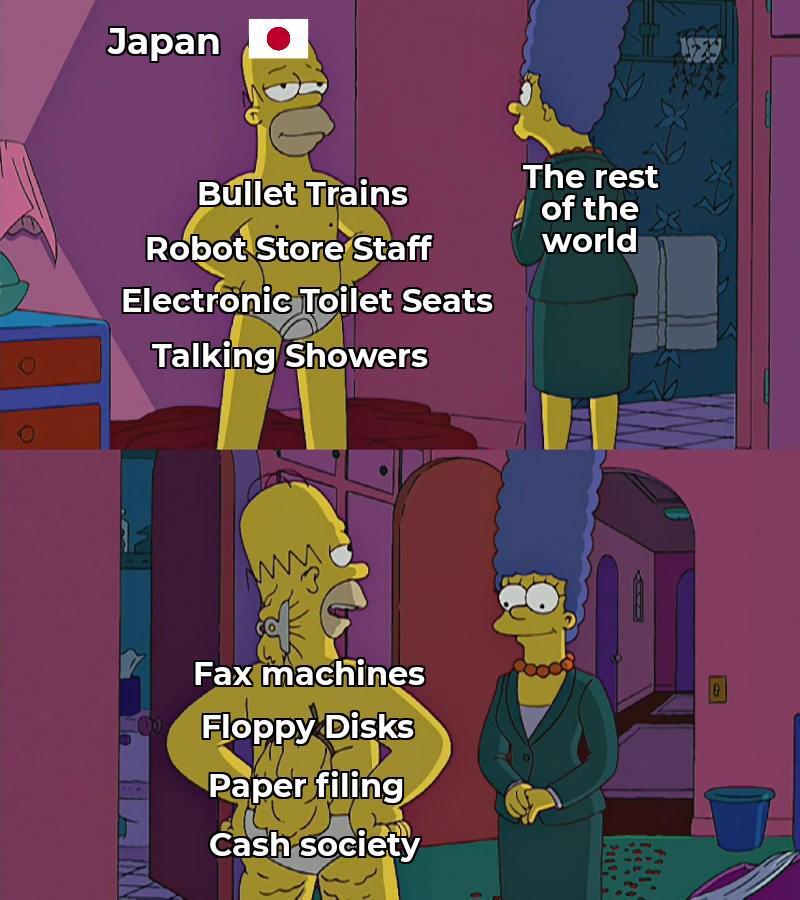this post was submitted on 28 Nov 2023
1145 points (95.5% liked)
memes
13987 readers
2530 users here now
Community rules
1. Be civil
No trolling, bigotry or other insulting / annoying behaviour
2. No politics
This is non-politics community. For political memes please go to !politicalmemes@lemmy.world
3. No recent reposts
Check for reposts when posting a meme, you can only repost after 1 month
4. No bots
No bots without the express approval of the mods or the admins
5. No Spam/Ads
No advertisements or spam. This is an instance rule and the only way to live.
A collection of some classic Lemmy memes for your enjoyment
Sister communities
- !tenforward@lemmy.world : Star Trek memes, chat and shitposts
- !lemmyshitpost@lemmy.world : Lemmy Shitposts, anything and everything goes.
- !linuxmemes@lemmy.world : Linux themed memes
- !comicstrips@lemmy.world : for those who love comic stories.
founded 2 years ago
MODERATORS
you are viewing a single comment's thread
view the rest of the comments
view the rest of the comments

Most emails are unencrypted. And indeed, in the medical profession, they were widespread. Nothing can protect from the sender putting in the wrong number or email address. I've received some seriously sensitive emails not meant for me because the people made typos and the recipients had the same family name as me (not sure how the email server decided it was close enough and delivered them to me).
I've also read for some businesses, it was critical to get an instant receipt that the fax has been properly received.
Now, I'm not defending using obsolete fax machines, it just had one advantage over email but today there are much better alternatives and dedicated platforms.
No, they are not. They are not end-to-end encrypted but they are encrypted between your PC and your service provider, between service providers and between service providers and receivers. End-to-end encryption is needed to defend against your service provider or entities that can order your provider around but not against random hackers snooping around in your network.
Fax on the other hand is never encrypted and also not signed, so there is no integrity protection. Fax is far, far less secure than even standard email. Businesses require fax often for legal reasons because laws are written by people with no technical understanding not because of any technical reason.
This is true AND untrue at the same time! It's true that most e-mail providers will talk to other e-mail providers with TLS, but it's trivial to downgrade the connection in most circumstances. If you can man-in-the-middle e-mail servers you can just say "hey, I'm the e-mail provider you're trying to talk to, I don't support TLS, talk to me in plain text!" and the senders will probably oblige. There's a few standards to try to address this problem, like DANE (which actually solves the problem, but is unsupported by all large e-mail providers), and mta-sts which is a much weaker standard (but supported by gmail and outlook). In practice there's a good chance that your e-mail is reasonably well secured, but it's absolutely not a guarantee.
That depends on the specific TLS setup. Badly configured TLS 1.2 would allow downgrade attacks, TLS 1.3 would not. I highly doubt the "in most circumstances" line, my guess would be that at least the big ones like gmail don't allow unsecured communication with their servers at all. If not for their users's privacy, then at least to combat spam.
Why would TLS 1.3 prevent this kind of downgrade attack? The issue is that TLS has never been a requirement for e-mail servers, so for interoperability they only do TLS opportunistically. Even if you configure your own e-mail server to only talk over TLS, nobody else knows that your server only speaks TLS (or speaks TLS at all), so if somebody is pretending to be your mail server they can just claim to only speak plain text and any sender will be more than happy to default to it. If you support DNSSEC you can use DANE to advertise that your mail server speaks TLS, and even fix the certificates that are allowed, but senders will actually have to check this in order to make sure nobody can intercept your e-mail. Notably both outlook and gmail do not support this (neither for sending nor receiving!), they both instead rely on the weaker MTA-STS standard.
They absolutely do :).
That was maybe too strong of a statement, at least with the recent adoption of MTA-STS this is at least less trivial to do :). The intent of this statement was more "if you are in the position to be a man-in-the-middle between two generic e-mail servers it is trivial to downgrade the connection from TLS to plaintext". I wouldn't be surprised if it was hard-coded that gmail and outlook should only talk to each other over TLS, for instance, which should prevent this for e-mails sent between the two (I also wouldn't be surprised if this wasn't hard-coded either... There's sort of a bad track record with e-mail security, and the lack of DNSSEC from either of these parties is disappointing!). Ignoring special configuration like this, and without MTA-STS or DANE these downgrade attacks are trivial. Now with the advent of MTA-STS you'll probably have a reasonably hard time downgrading the connections between some of the large e-mail providers. Though notably this is not universally supported either, iCloud supports neither MTA-STS nor DANE for instance, and who knows about all of the various providers you never think of. This is a bit of a tangent, but a good talk about how large mail providers might not be as well configured as you'd hope: https://www.youtube.com/watch?v=NwnT15q_PS8